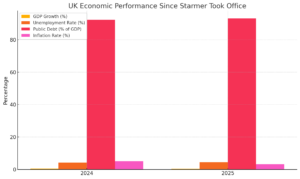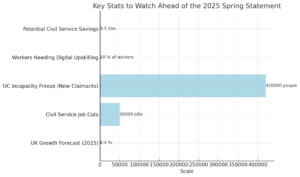 BBC News
BBC NewsBorrowing was £17.4bn last month, the second highest October figure since monthly records began in 1993.

Finito World
It used to be the case that the Budget was a kind of economic nativity play: performed twice a year, followed dutifully by a flurry of commentary, and then largely forgotten. But this year’s Spring Statement, to be delivered later today by Chancellor Rachel Reeves, is shaping up to be one that may quietly—and perhaps clumsily—reshape the way Britain thinks about work, welfare, and the value of individual contribution.
Reeves finds herself in a tight spot. The Office for Budget Responsibility now expects growth to come in at 0.4% for 2025—half the previous forecast—and public debt sits at 93.2% of GDP. If the Chancellor is hoping to conjure optimism, she’ll be working with ingredients more suited to austerity-flavoured gruel than celebratory cake.
The signs suggest this will be a budget of recalibration: a tightening of the belt without quite admitting the waistband is already painfully snug. As readers can see from the graphic below, it’s not exactly been an inspiring start to the Starmer administration if you look at the raw data.

Among the expected headlines is a freeze on the Universal Credit incapacity benefit element for new claimants until 2030. “This is about fairness and sustainability,” Reeves has said. But fairness, like everything in economics, is political code. The Resolution Foundation estimates over 420,000 people could be affected, with those experiencing mental health challenges disproportionately impacted. As Torsten Bell put it: “You can’t ‘freeze’ people’s needs.”
Also reportedly on the table is a plan to cut 50,000 civil service jobs, a move that could save around £3.5 billion over the next parliament. Whether that translates to leaner efficiency or a hollowing-out of capability remains to be seen—especially when the civil service quietly underpins much of the UK’s employment support infrastructure.

For those of us working in employability, these measures raise deeper questions. What does it mean to be “ready for work” in 2025? Who decides? And what support structures are actually in place to help people get there?
There’s talk of a renewed push to “make work pay.” But meanwhile, job seekers are navigating a landscape shaped by automation, algorithmic hiring, and ever-shifting skill requirements. A recent CIPD report found that one in five UK workers feel they lack the digital skills now expected of them—and yet few concrete plans have emerged to meet this need at scale.
There is also expected to be movement on an Employment Rights Bill that would, among other things, grant new workers unfair dismissal protection from day one, dramatically reducing probation periods. It sounds progressive, and may well be, but some employers have raised concerns that it could dampen enthusiasm for hiring—especially within SMEs.
This is where employability becomes a kind of moral fulcrum. We’re asking people to be ready, to be flexible, to be entrepreneurial—but without always providing the tools or psychological safety to make that possible.
There are, however, glimmers of optimism. A new £1.3 billion Future Growth Fund is expected, aimed at supporting innovation and new industry—an overdue tilt towards building the kinds of sectors that might offer long-term career paths. And while tax thresholds may be left largely untouched, continued National Insurance cuts may offer a marginal boost to take-home pay.
Ultimately, this Spring Statement is unlikely to deliver fireworks. But it may offer something else: a mirror. A reflection of the difficult questions facing not just the Chancellor, but all of us. What is the future of work? How do we build an economy that is both productive and humane? And how do we prepare people—not just to earn, but to thrive?
At Finito, we’ve long believed that employability isn’t a policy—it’s a person. It’s confidence rediscovered, purpose restored, direction found. That sort of transformation doesn’t show up in GDP figures, but it’s the true engine of any healthy economy.
Perhaps the most employable trait in 2025 is readiness for change. Today’s statement might not answer all the questions. But it will, if we’re listening, tell us what questions we need to ask next.